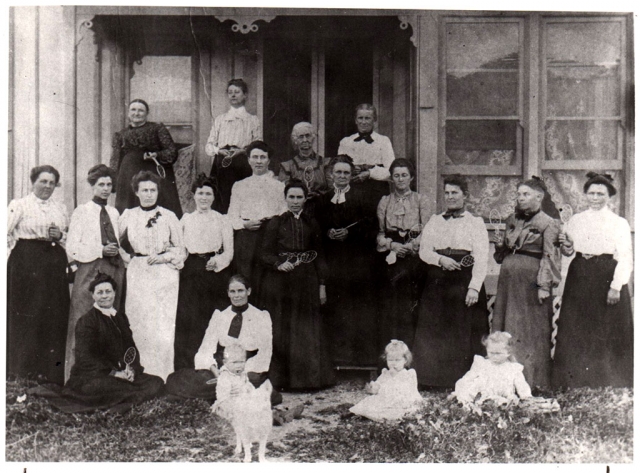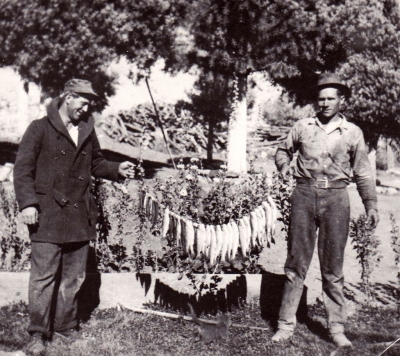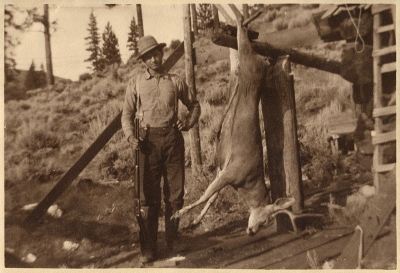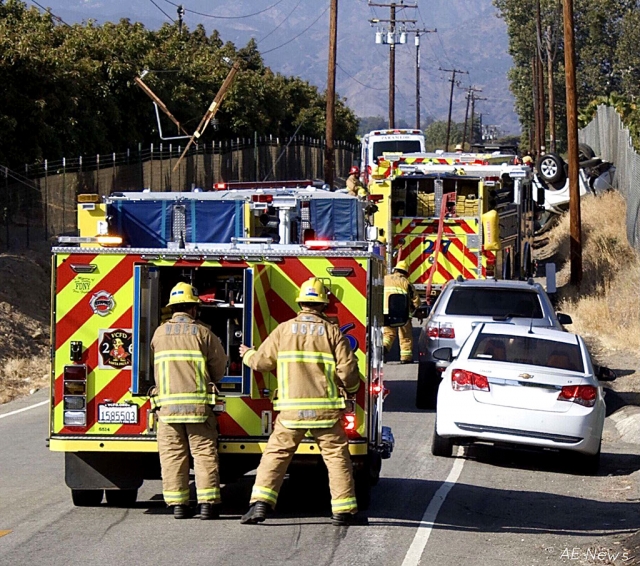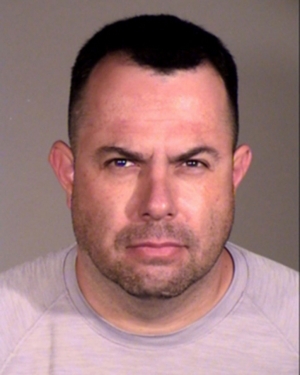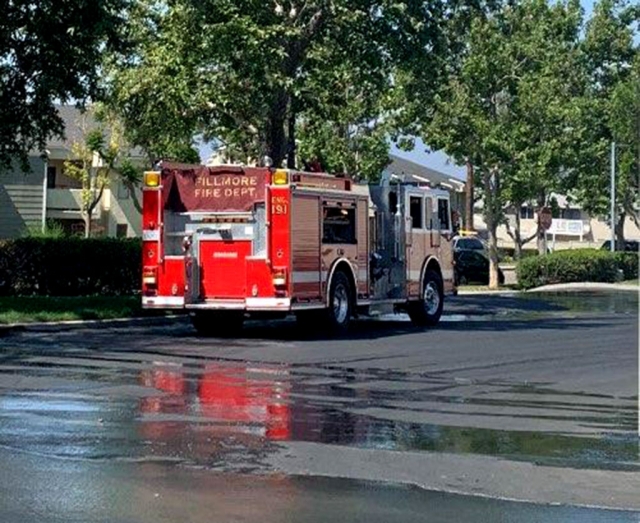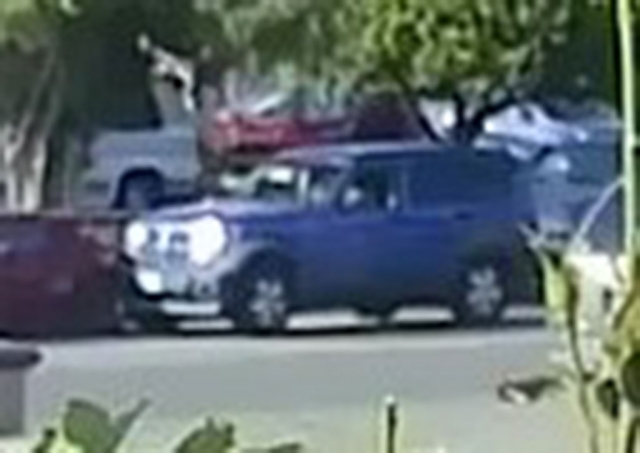 Photograph of the actual vehicle. Photos courtesy Ventura County Sheriff ’s Department. Enlarge Photo By Ventura County Sheriff Department — Wednesday, June 9th, 2021
 Photograph of a similar model to the suspect’s vehicle involved in the hit & run incident. Enlarge Photo On May 30, 2021, at approximately 5:51 P.M., a traffic collision occurred in the 900 block of Santa Clara Street in the City of Fillmore and the driver fled the scene. The collision was caught on video surveillance. A still photograph of the actual vehicle along with a photograph of a similar model to the suspect’s vehicle is attached. The suspect’s vehicle was traveling westbound on Santa Clara Street, just east of Glen Way, when it collided with an unoccupied parked vehicle resulting in substantial damage. The suspect’s vehicle was identified as a newer model blue Jeep Liberty or Dodge Nitro SUV (unknown license plate). The suspect’s vehicle sustained front end damage and the suspect quickly fled the scene without reporting the accident. The Ventura County Sheriff’s Office is requesting the public’s assistance with any information regarding this crime. If you have any information, please contact Detective Pewsey at the below listed number or call the Fillmore Police Department at (805) 524-2234. The reporting party may remain anonymous. Join us in the fight on crime by following us on Twitter @VENTURASHERIFF, Facebook, Instagram @ VCSHERIFF, and with Nixle by texting your zip code to 888777 to receive local law enforcement and public safety alerts and advisories. Nature of Incident: Request for Public’s Assistance with Hit and Run Traffic Collision Ventura County Crime Stoppers will pay up to $1,000 reward for information, which leads to the arrest and criminal complaint against the person(s) responsible for this crime. The caller may remain anonymous. The call is not recorded. Call Crime Stoppers at 800-222-TIPS (8477). |
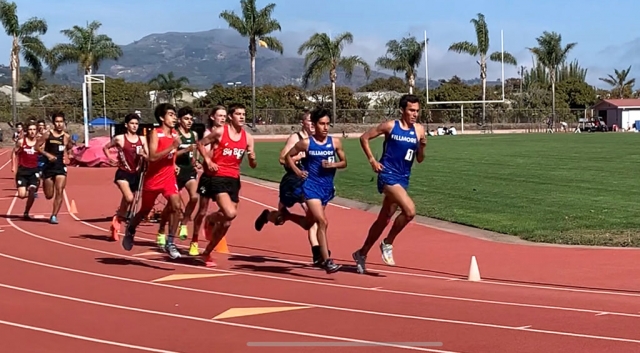 This past weekend Fillmore Flashes traveled to Carpinteria to compete in the CIF Prelims Division 4 Championships. Twelve athletes will return to Carpinteria Saturday, June 12th to compete in the CIF Division 4 Championships Finals. Pictured are Fabian Del Villar and Camilo Torres during their meet this past weekend. Enlarge Photo By Epi Torres — Wednesday, June 9th, 2021
On Saturday, June 5th, 14 Fillmore track and field athletes traveled to Carpinteria to compete in the CIF Prelims Division 4 Championships. The 14 athletes competed in 21 individual events, and one relay. Currently both boys and girls teams are ranked as the 6 best scoring team. In order to advance to the Finals individuals and teams must finish among the top nine in all heats of their event. Tenth and eleventh qualify and may run as first or second alternate. The boys varsity discus trio of Justice Rodriguez, Diego Meza and Joesef Vargas started the morning on a positive note by qualifying all three competitors into next Saturday’s CIF Southern Section Divisional Finals. Justice led all three athletes by posting a personal best of over six feet to finish 3rd overall with a toss of 126’ 9”. Joesef Vargas finished in 8th with a toss of 117’ 11”, and Diego Meza picked up the final qualifying spot finishing in 9th with a toss of 111’ 0”. The girl’s discus trio also performed well. They were led by Ashley Yepez who placed 4th tossing the implement 94’ 4”. Kara Ebell finished in 7th place reaching a distance of 88’ 6”. Both Ashley and Kara qualified and will compete in the Finals. Teammate Sadie Rico finished in 11th with a throw of 79’ 6”. She will be the second alternate. Ashley followed up her 4th place finish in the discus with a put that she muscled 28’ 6.5 inches for a tenth-place finish and earned a first alternate qualifier for the Finals. In the boys shot put, Fillmore placed 3 athletes into next week's Finals. Nathaniel Ocegueda was our top finisher, placing 4th with a heave of 43’ 11.5”. Teammate Joesef Vargas finished in 7th tossing the iron ball 42’ 5.75 inches, and Diego Meza finished in 8th with a put of 41’ 9.75”. Amani Hooker ran the 100 meter hurdles and placed 6th in a time of 16.95 to qualify for the Finals. She also ran the 100 meter dash and finished in 22nd place in a time of 13.40. Alianna Tapia competed in the 1600 meters and finished in 10th place in a personal best time of 5:34.58. She will be the first alternate in this event next week. She followed that up, later in the meet by placing 17th in the 3200 meter and posted a time of 12:48.33. Fabian Del Villar placed first in the 1600 meters, winning in a time of 4:20.87. Following close behind was teammate Rey Laureano who finished in 6th place in a personal best time of 4:29.02. Rey also ran and qualified in the 800 meters finishing in 8th place in a time of 2:04.05. Fabi also returned to capture a 3200-meter win in a time of 9:35.94. Also qualifying in this race was Camilo Torres who placed 4th in a personal best time of 9:37.72. Erick Gutierrez finished in 18th in a time of 10:27.66. This was a season best in this event for Erick. Both Rey and Fabi were double qualifiers, with Fabi posting the fastest times on the day in the 1600 meters and the 3200 meters. The final event of the day, the boys 4 x 400 proved to be exciting and controversial. After a team disqualification, Fillmore moved in to tenth place to finish as the first alternate. Runners on that team were Rey Laureano, Camilo Torres, Juan Alfaro, and Fabian Del Villar. They posted a time of 3:44.26. Twelve athletes will return to Carpinteria High School on Saturday, June 12th to compete in the CIF Division 4 Championships Finals. A total of 11 athletes will compete in 14 events, with several other hoping to get into the meet as first and second alternates. The meet will start at 1:00 PM. |
|
By Anonymous — Wednesday, June 9th, 2021
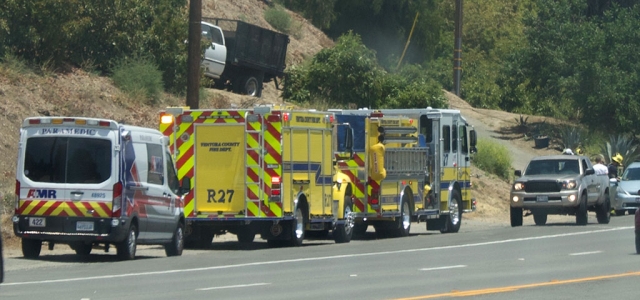 On May 5th, 2021, at 12:29pm, California Highway Patrol, VCFD and AMR paramedics were dispatched to a traffic collision in the area of Creek Canyon (East Telegraph Road). Upon arrival fire crews reported three vehicles involved— a blue Toyota, black CIV and a grey Honda Accord. All vehicles sustained minor damage, no injuries. Ventura County Sheriff ’s Department units were also dispatched to the scene. According to the CHP Traffic Log the cause of the crash was due to road rage. Photo courtesy Angel Esquivel—AE News. Enlarge Photo |
|
By Anonymous — Wednesday, June 9th, 2021
 If officials determine someone discharged dangerous fireworks from a property or place that you own, rent or control, you can be issued a citation and subject to a fine or arrest. The fine amount for allowing dangerous fireworks to be discharged from a property that you control/rent/own is up to $1,000. Courtesy City of Fillmore Facebook page. Enlarge Photo |
|
By Anonymous — Wednesday, June 9th, 2021
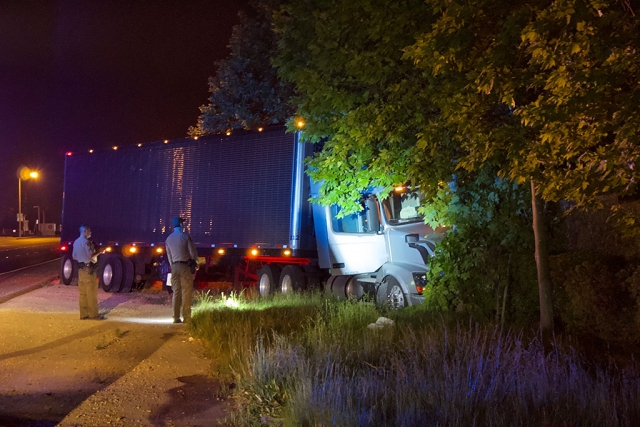 On June 4th, 2021, at 11:30pm, a Ventura County Sheriff’s Department unit was flagged down by a civilian concerning a possible injury collision in the area of Ventura Street and Mountain View. The police unit responded with lights and sirens to the reported area. Upon arrival the deputy found a semi-truck crashed into a brick wall near The Bridge’s homes. Police units shut down eastbound Ventura Street #2 lane for about 30 minutes. No injuries were reported. Photo courtesy Angel Esquivel—AE News. Enlarge Photo |
|
By Anonymous — Wednesday, June 9th, 2021
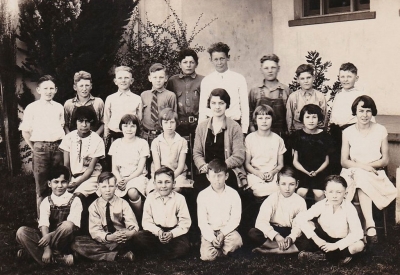 Bardsdale Grammar School class circa 1925. These children would have benefitted by the Bardsdale School “Congress of Mothers” who provided lunches for school children. Enlarge Photo Courtesy Fillmore History Museum One of our readers asked what people ate “back then” and particularly about what children took to school for lunch. It was also quite easy for ranchers and others to bring in small game, so the housewives needed to know how to cook it. The cookbooks all contained recipes for fried rabbit as well as rabbit stew and hasenpfeffer (rabbit stewed with onions, cloves and cinnamon). In the 1924 “Cook Book” put out by The Ladies’ Aid Society of the Piru M. E. Church, Mrs. S. L. Glaze recommended stewing the rabbit, making a gravy and pouring the meat and gravy over hot biscuits. Game birds, including geese, ducks, snipe and woodcocks would be roasted, stewed or baked in a pie. If you either didn’t have or didn’t want meat, there were other alternatives for a main dish such as Boston Roast, a recipe given by Mrs. Frank Padelford: “Three cups red or kidney beans, put through grinder or sieve; one cup bread or cracker crumbs; one tablespoon finely chopped or ground onion; one cup finely grated cheese; one and one-half teaspoon salt; one-fourth teaspoon paprika or pepper. Mix and add milk enough to make it soft enough to pack together. Bake in buttered pan or casserole thirty minutes in a slow oven. Serve with a tomato or onion sauce. It is good served plain.” In the “People’s Home Library” published in 1920, Mrs. Alice G. Kirk of Cleveland, Ohio, gives extensive directions on how to prepare sandwiches for school lunches.A different kind of bread should be used for each day, or a combination of breads to relieve the monotony. She suggests the following fillings: “Meat sandwiches. - Cold roast beef chopped and slightly salted, between slices of white bread. Chicken, cut very thin and salted; white bread. Boiled ham, chopped very fine, mixed with a very little dry mustard; brown bread. Roast veal, finely chopped, with a few olives mixed in; brown bread. One very thin layer of chopped ham and a slice of chicken; wheat bread. Corned beef shaved very thin; white bread. Salad sandwiches. - Lettuce leaves on white buttered bread, with a very little French dressing made by mixing a teaspoon full of oil with few drops of lemon juice and a little salt. Chopped watercress on buttered bread, white or brown, with salt. Very thin slices of cucumber, with salt; white bread. Nasturtium leaves, with French dressing or salt. Lettuce with a little cream cheese spread on it, and salt or lemon juice.Watercress and cream cheese. Celery, chopped very fine and mixed with either French dressing or a little mayonnaise, or merely with salt and lemon juice; whole wheat bread. Chopped green peppers mixed with cream cheese.” It is unlikely a housewife in the Santa Clara Valley sent her children to school with a sandwich of nasturtium leaves or finely chopped roast veal. Bardsdale School “Congress of Mothers” (a forerunner of the PTA) was organized in 1925 or 1926.Soon the group noticed that many of the small children who walked to school each day arrived without breakfasts and sometimes with little lunch. They decided to do something about it. The mothers began to take turns bringing the children hot lunches which they prepared at home. After lunch two of the mothers would stay and wash the dishes. Soon they raised enough money with cake sales to purchase cooking utensils and hot plates. They cooked lunch in the hallway and served the children on tables built for that purpose. At Sespe Elementary School in the 1950s and earlier, before there was a cafeteria, the children ate their lunches under the pepper trees at the west end of the school yard. This was the location come wind, cold weather or 100+ degree heat. The only time when lunch was eaten inside was when it was raining. Milk was purchased each morning by sending your lunch money to the office. Students vied to be the person collecting the lunch money. (Anything to get out of class for a few minutes.) Graduation from 6th grade meant moving on to the Junior High School then located in the same buildings as the High School. Lunch was hot and in the cafeteria. The women employed in the cafeteria made all lunch meals from scratch, even the hamburger and hot dog buns. We have come a long way from the early days of school lunches. Today the staff may not make every meal from scratch but every child who needs a lunch or breakfast will get one at school, even during covid when meals were still provided in a drive setting. |
|
By Anonymous — Wednesday, June 2nd, 2021
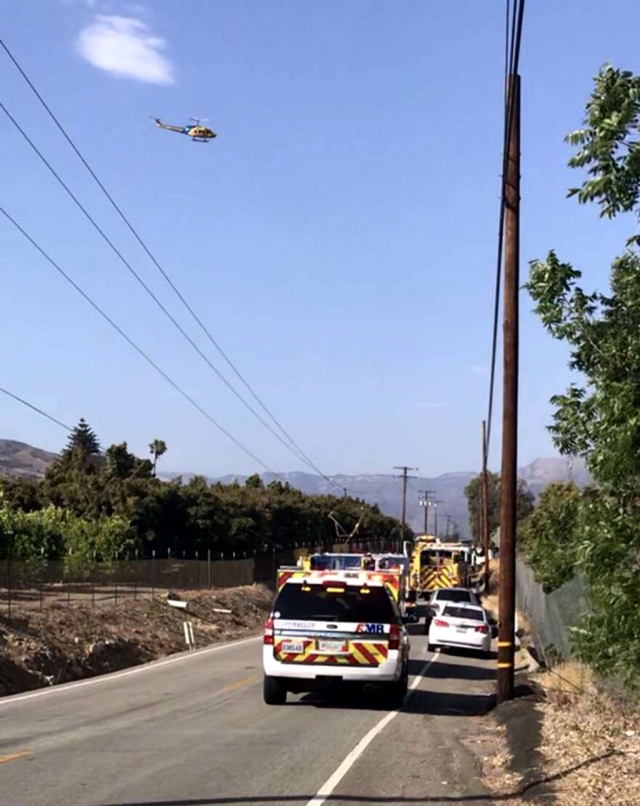 On Sunday, May 30, 2021, at 4:46pm, the Ventura County Fire Department, CHP, and AMR Paramedics were dispatched to a heavy traffic collision in the area of Sycamore Road, north of Highway 126. Arriving on scene fire crews reported a 2015 Nissan Altima travelling eastbound on Sycamore had severed a utility pole, with wires down. One person was reported in the roadway with another person trapped inside the vehicle. Fire crews were able to extricate the person trapped in the vehicle; the person in the roadway was declared deceased. He has been identified as David Brown, 39, of Fillmore, a former volunteer Fillmore Firefighter until 2017. A VCSO helicopter was also in the area but was canceled by fire crews once ambulance transport made patient condition unknown. Ventura County Sheriff ’s Department units were also on scene. CHP shut down Sycamore & 7th Street/Hwy 126 & Sycamore until 8:00pm. Photos courtesy Angel Esquivel-AE News. Enlarge Photo |
|
By Ventura County District Attorneys Office — Wednesday, June 2nd, 2021
District Attorney Erik Nasarenko announced today that former Ventura County Sheriff’s Deputy Leonard Herrera Lopez (DOB 08/06/71), pled no contest to two misdemeanor offenses involving a female inmate at the Ventura County Jail. Lopez was charged with engaging in consensual sexual activity with a female inmate, a violation of Penal Code section 289.6(a)(2), and with entering the cell of the same female inmate without another employee present, in violation of Penal Code section 4021(b). On September 6, 2019, the female inmate was assigned to a custody unit under Deputy Lopez’s control and supervision. Lopez entered the inmate’s cell unaccompanied by other jail staff in the early morning hours of September 6, 2019. Lopez kissed and touched the inmate, which constituted the sexual misconduct with her. The inmate later reported Lopez’s conduct to other jail staff. The Sheriff’s Major Crimes Bureau immediately launched a comprehensive investigation. Under state law, inmates are incapable of providing legal consent to engage in any sexual activity with custodial staff. Lopez is scheduled to be sentenced on June 24, 2021, at 1:30 p.m. in courtroom 14 of the Ventura County Superior Court. Lopez faces a maximum possible sentence of 180 days in jail and one year of probation. |
|
By Anonymous — Wednesday, June 2nd, 2021
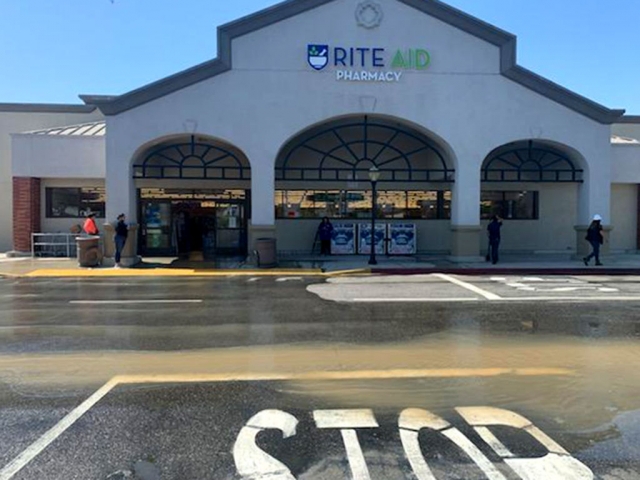 Rite Aid was closed Tuesday morning, before 10am, due to severe flooding. Pressurized water was rising through the floor according to Fillmore Fire Chief Keith Gurrola, possibly compromising the foundation. The rising water was 4 to 5 inches below the electrical outlets, being monitored by Fillmore Fire. Electricity was still on at noon. Preparations were being put in place to preserve the refrigerated medications in the pharmacy in case the electrical was shut off. Hardhats were required for all personnel entering the store. Enlarge Photo |
 This year’s 2021 class of Alan Peterson scholars. (l-r) Evan Alamillo who will attend CSU Channel Islands, Estefany Gonzalez who will attend Ventura College, Mariam Bazurto who will attend UC Davis, and Olivia Palazuelos who will attend Fresno State. Enlarge Photo By Anonymous — Wednesday, June 2nd, 2021
The Santa Clara Valley Wellness Foundation Scholarship Committee have selected their 2021 class of Alan Peterson Scholars. For the 11th consecutive year, four outstanding high school seniors will be awarded $1,000 renewable scholarship for their college education in the field of medicine. The candidates were selected not only for their overall grades but also their participation in the community, leadership, and desire to help their community when they complete their college degrees. Applications were accepted from students who reside in the cities of Fillmore, Piru, and Santa Paula. Each scholarship recipient went through an application process including submission of personal essay, letters of recommendation, and a board panel interview. The 2021 class of students who will receive scholarships are from Fillmore High School - Mariam Bazurto, attending UC Davis, Evan Alamillo, attending CSU Channel Islands, Olivia Palazuelos, attending Fresno State, and Estefany Gonzalez, attending Ventura College. “Every year that we go through the interviews, the bar is raised by the students themselves. All students are so bright and of such high caliber. It makes it hard to choose the finalists.” says Gloria Camarillo, Executive Director for the Santa Clara Valley Wellness Foundation. “The Foundation is able to support local youth in furthering their college education through the generous donations from private and community donors.” Visit the website www.scvwf.org to find out more information on the various programs for the community. Medical professionals, have you been wanting to give back to your community and don’t know where to start? We are actively scouting for medical professionals that share the vision of providing the opportunity to youth to experience what the medical field has to offer. Please contact the Executive Director, Gloria Camarillo, telephone 805‐320‐9049 or email gcamarillo@roadrunner.com to discuss the opportunity. |




